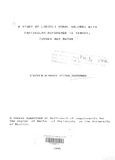| dc.description.abstract | In contemporary Kenya, aspects of social and moral instability have been aggravated by changes in life patterns both in rural and urban areas. Hence,rehabilitation centres, law courts and jails are not sufficient attempting in curbing such ills in society. Inorder to curb this situation of immorality,there is greater interest in many African sectors of
society for efforts to recapture the lost African moral values. It is within this setting that the present study endeavours to highlight the indigenous Logooli morality. This study on the Logooli investigates first,the meaning and practice of indigenous Logooli morality and moral education. Second, the part played by taboos as cardinal elements for enforcing morality among these people. Third, the role of oaths and curses as elements of asserting truth behind certain actions. Fourth, how deviant members in Logooli were dealt with and incorporated into the society.Two main research instruments have been employed in this work. First, primary data encompassing oral
sources whereby questionnaire schedules were administered to 55 purposively selected informants.Their selection was based on age categorization,gender balance, accessibility and level of education.The informants comprised mainly elderly peasant
farmers, teachers, students, businessmen and civil servants. Second, written sources constituting books journals, theses and archival material obtained from the Jomo Kenyatta Memorial Library at the University of Nairobi University,and the Kenya National Archives have been used in this study.Moral education was a life long process where
moral principles were taught through formal, informal instructions, imitating parents, older siblings, peer groups, grandparents and guardians. The youth were encouraged to observe courtesy, compassion, justice,prudence, temperance, fortitude, humility and
chastity among other moral values.Taboos in the indigenous Logooli society were
vital elements of enforcing morality. They instilled discipline, reduced crime and carelessness in society. Most taboos as moral sanctions were found in rites of passage, agricultural practices, usage of tools, weapons and in house related activities.
The elaborate system of direct and indirect curses reinforced justice, respect of each other and property among the Logooli. Since the negative consequences of curses was felt by the concerned victim, family and clan members at large, people restrained from cursing each other any minor reason.Assertory oaths were taken in order to test
child legitimacy, inhibit theft and alleged forms of witchcraft. While promissory oaths were taken inorder to strengthen faithfulness and friendship.Among sanctions of morality was ritual cleansing which was conducted· in the indigenous society so as
to restore the state of normality among offenders.Some of the offenses that required ritual cleansing were incest and murder.Nevertheless, socio-economic, political and
religious changes have affected the observation of some of the indigenous Logooli moral values in the contemporary society. Indeed, the teachings obtained from the indigenous Logooli moral values could help in understanding the moral problem
Kenya. Since children spend most of their time in contemporary school with their teachers and peers, they could be encouraged to visit and learn from their grandparents
during school holidays. And while at their various homes, children could be encouraged by their parents to watch only appropriate video and television programmes.Most teachings that are associated with oaths and curses the observation of taboos, in the
indigenous Logooli society are universal moral elements that are found in many societies in Kenya and beyond. Hence it is vital to enhance the main teachings that emanate from these moral values.The current study could be of great help in
teaching Social Education and Ethics in the Kenyan Secondary schools. And, there is need for more research of this nature on various ethnic communities in Kenya. For, its hoped that such research could help in strengthening morality in contemporary Kenyan
society. | en |

